Anniversary of Nelson Mandela's passing
"The Bonds that Bind Us: Remembering Madiba in a Time of Global Fracture"
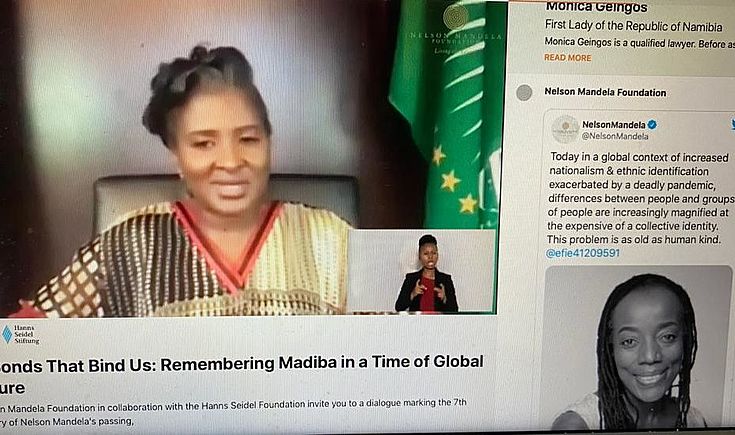
The award winning online platform of the NMF carried a livestream - and participants could ask questions online
HSF
Incisive analysis on challenges and how to address them
Nelson Mandela Foundation Chief Executive Sello Hatang facilitated an insightful, important, inspiring Dialogue carried live on major TV stations. The speakers reflected candidly and deeply on belonging, on reckoning with the past and healing, and on the serious, painful challenges the people of this region and the continent have to live with. Crucially, they also shone light on how to face and address these challenges, together. Among the focus areas were corruption, widespread violence, lack of social cohesion, nationalism and xenophobia, which is often fuelled by politicians seeking to capitalize on it. Monica Geingos warned: violence must not be normalized - and it's essential to invest in psycho-social support as well.
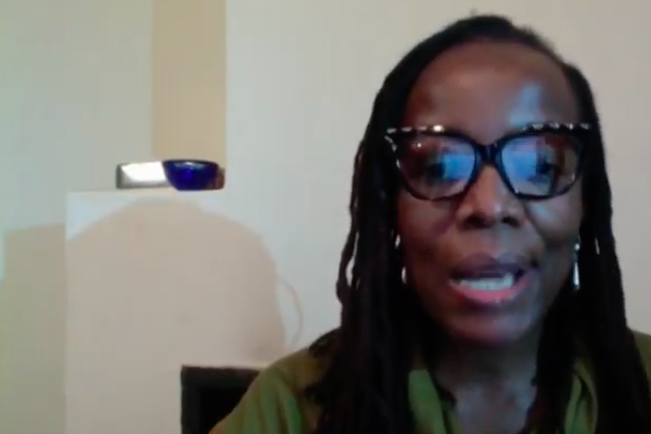
Tsitsi Dangarembga - shortlisted for the Booker Prize 2020, arrested at home in Zimbabwe
HSF
Tsitsi Dangarembga - trail blazing writer and public intellectual
With her novel “This Mournable Body”, the Zimbabwean writer Tsitsi Dangarembga was on the shortlist for the prestigious Booker Prize 2020, which is regarded as one of the most important literary awards worldwide. As a student, in 1988, she had been the first black Zimbabwean woman to publish a novel in English, “Nervous Conditions”, which was honored by the BBC in 2018 as one of the "Top 100 Stories That Shaped the World". She has also just been named one of the "100 Most Influential Africans in 2020". The globally acclaimed writer had also been arrested in Zimbabwe earlier this year - for demonstrating peacefully.
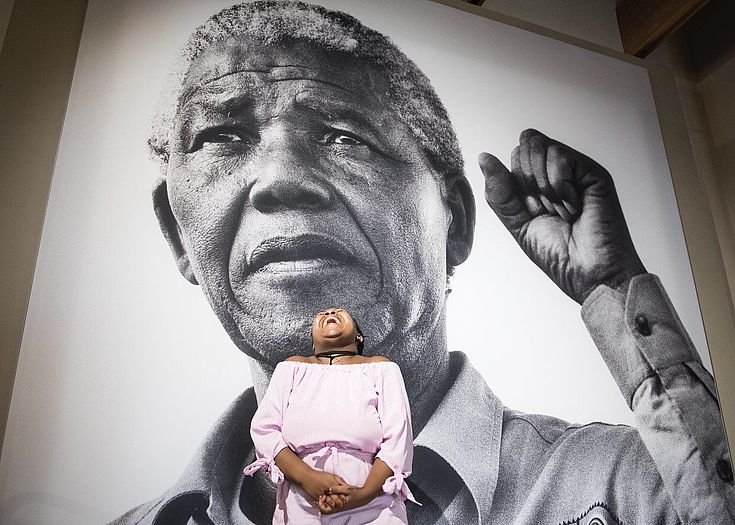
A student during a break at HSF Civics Academy Youth Dialogue, Nelson Mandela Foundation
Distilled Photography
"Education for change"
For the occasion of this event, Tsitsi Dangarembga had crafted a multi layered, incisive, nuanced text, full of food for thought, on which she based her contribution. Her rich text represents a systematic, creative, practical response to the questions posed to her in advance by the organisers – and to those she developed further from them. In her essay, she also refers to famous quotes by Nelson Mandela, connecting them with each other, and interweaving them with her own analysis which focussed on themes of division, the indivisibility of freedom, dominators, and “education for change” - in which literature and the arts have a vital role to play. Reflecting on the role of elites, she also states "it has proven a challenge to interest influential and resourced Africans in changing the subjective, agency-building life of the continent."
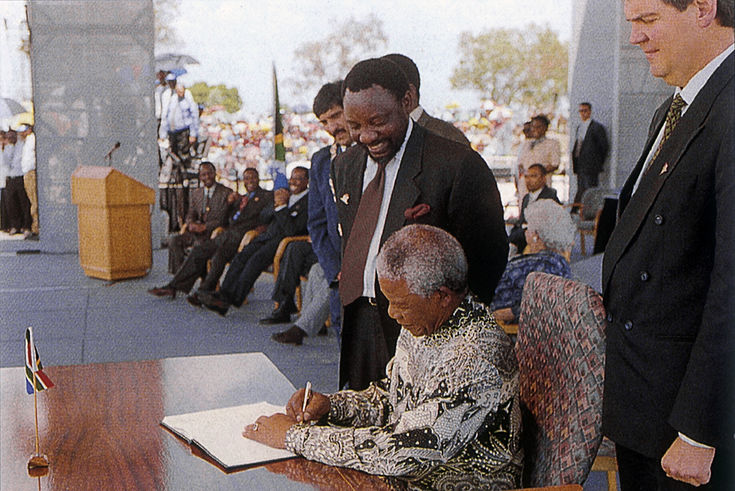
Historic photograph: Nelson Mandela signing the new Constitution, which became valid in 1996
HSF
Healing wounds, and overcoming trauma
Speakers referred to structural and physical violence of the colonial era and wars that led to its end, as well as the apartheid years. These left open wounds and scars in the “collective psyche” as well, which often have yet to be named, and understood as not overcome until today. Monica Geingob emphasized "We have to understand what it means to live in a post-conflict society". The past, unresolved in many respects, is still casting long, dark shadows. Intergenerational trauma, which can be traced back to decades of oppression, tyranny, fragile social ties, extreme poverty and poor governance, needs to be addressed, researched and alleviated in many countries in Southern Africa - in society as a whole, in public discourse, in institutions and individually.
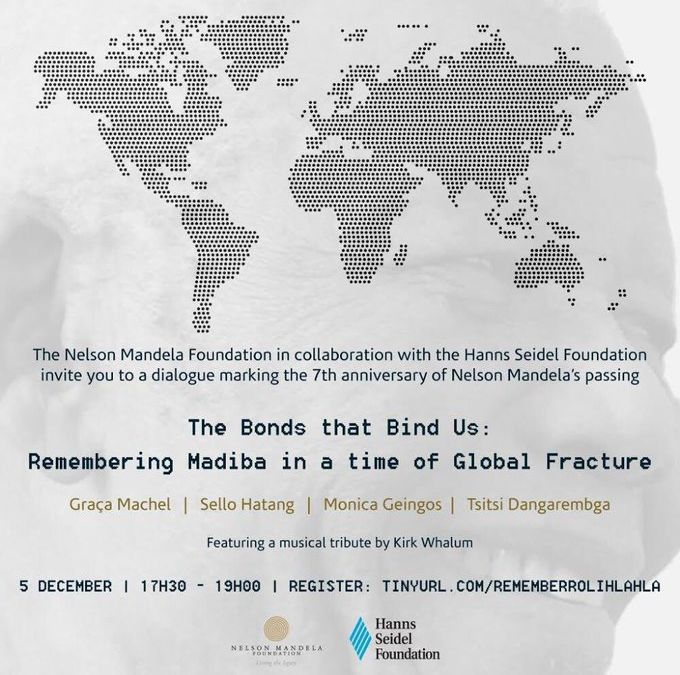
Invitation for the Dialogue which was carried live on several TV stations
NMF
Potential and responsibilities of different societal sectors
The speakers emphasized that joint societal efforts are required, as well as the political will of decision-makers, improved governance and efficient states, in order to protect and develop democracy, promote inclusive economic growth and support urgently needed violence prevention in many ways. "We need compassionate and competent leaders. We need more Madibas" said Monica Geingos.
Analysing the historic connections in the region and how they have been developing since, Graça Machel emphasized the SADC exists in name alone. She called on the very active civil society organisations in several countries to focus on (re-) connecting, and on reviving relevant ties and solidarity.
The reflective conversation provided valuable insights and outlined potential paths to continue working on the realization of Mandela's legacy - and finally and in the not too distant future to enable millions in the region to live in dignity.
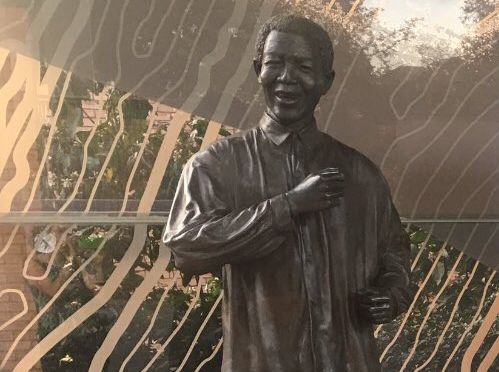
Statue of Nelson Mandela - dancing, in front of his Foundation
HSF
"Long Walk to Freedom"
Tsitsi Dangarembga recalled the title of Nelson Mandela's autobiography when she warned realistically and prophetically:
“I conclude by saying, as Mandela's walk to freedom was long, so should we not expect the walk of our continent or the walk of the globe of which our continent is a part, to freedom to be short. However, my greater concern at this juncture is with our continent. The walk of the different regions, nations, groups and individuals of our continent to freedom will be long. To attain our goal, we are called upon to educate ourselves and each other for change. The objective of this education for change is to expand our imaginations so that we can imagine free, prosperous conditions that we desire together and share together, and thus motivate an ongoing long walk together towards this vision in the knowledge that this prosperity and freedom can only be true prosperity and freedom when it is the prosperity and freedom of all.”
The full text by Tsitsi Dangarembga, published on the Nelson Mandela Foundation website, can be found here.
Read the Media Statement the Nelson Mandela Foundation issued after the event here.
Watch a recording of the Dialogue here:
Nelson Mandela Foundation Dialogue with former First Lady Graça Machel, award-winning Zimbabwean author Tsitsi Dangerembga and the First Lady of Namibia Monica Geingos (December 2020)
NMF
Subscribe to our Newsletter to receive event invitations and new publications - and follow us on Facebook and Twitter for news about our work.
